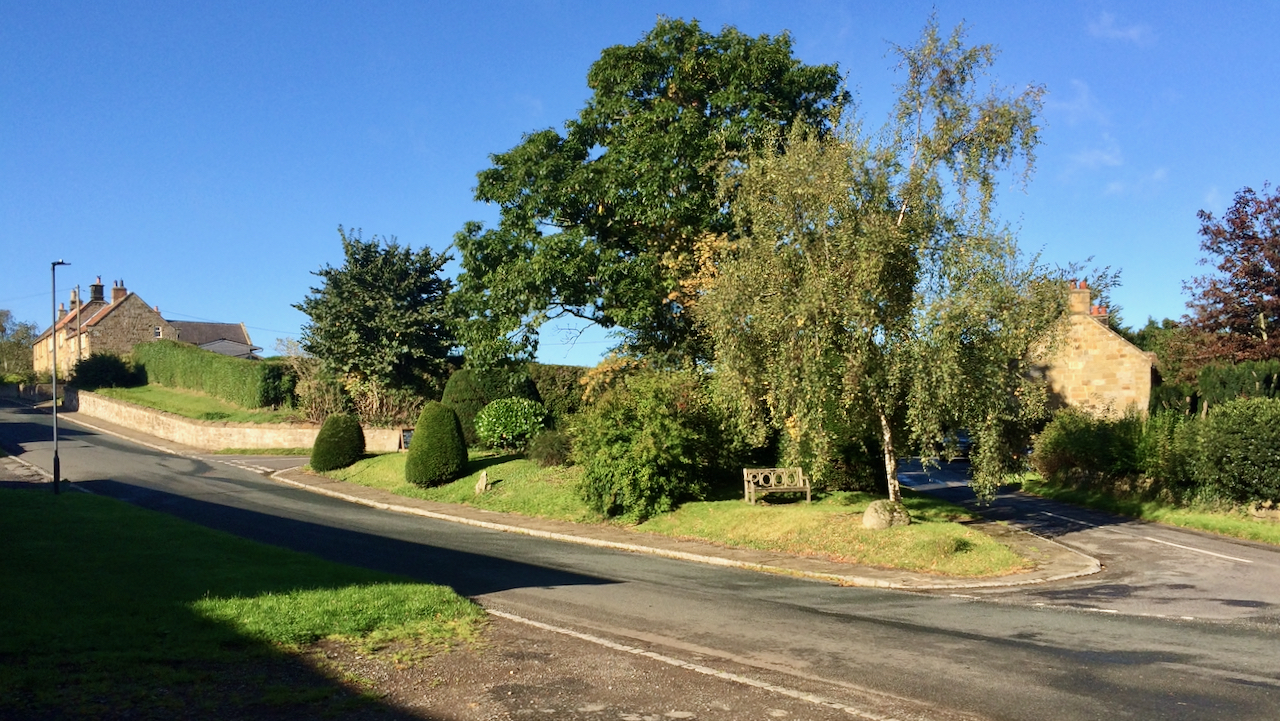The ‘village green’ at Kildale. Another glorious morning. And Michaelmas day to boot.
St Michael’s Day, 29th September, the Feast of Michael and All Angels, one of the traditional four ‘quarter days’ in a year, the other being Lady Day (25th March), Midsummer (24th June), and Christmas (25th December). On these religious festivals, the agricultural life of a community revolved, servants were hired, leases commenced, and rents were due. By Michaelmas, the harvest would have ended and a new farming cycle begun. In the Vale of York, Michaelmas was when ewes were put to the tup, until the end of October11796 The Rural Economy of Yorkshire Vol 2.
It was a time for ‘praying’. That had nothing to do with religion but ridding a moor of all stock. Generally done twice a year (at Lady Day, and at Michaelmas), with a view to ascertaining whether anyone has put stock there without a right to do it. Any unclaimed stock is then pounded till claimed by the owner, who was usually obliged to pay for trespassing21852 A Dictionary of Archaic and Provincial Words- obsolete phrases, proverbs, and ancient customs, from the fourteenth century, by James Orchard Halliwell-Phillipps, Vol. 2. P. 642.
Michaelmas was a time for the holding of ‘courts leet‘ to administer local disputes and for the parish constable and other officers to be elected3Trotter, E. (1919) ‘Seventeenth century life in the country parish : with special reference to local government’, Cambridge: University Press, available: https://link.gale.com/apps/doc/F0150910903/GDCS?u=ed_itw&sid=bookmark-GDCS&xid=3b7e5656&pg=117 [accessed 23 Aug 2021].. Michaelmas is even used by the highest courts in the realm as a division of the legal year4Contributors to Wikimedia projects (2002). Christian festival. [online] Wikipedia.org. Available at: https://en.m.wikipedia.org/wiki/Michaelmas#Use_by_legal_profession [Accessed 29 Sep. 2021]..
I said before Michaelmas was a day for hiring new servants and agricultural labourers, which also meant that the old servants had to pack up their belongings on this day on leaving for their fresh servitudes. Hence the dialect name ‘Pack-rag-day’5Orchard Halliwell-Phillipps, James. “A Dictionary of Archaic and Provincial Words- obsolete phrases, proverbs, and ancient customs, from the fourteenth century”. Vol. 2. P. 597. 1852.
Another local name for Michaelmas is ‘Goose-feast’ on account that it was traditional to eat a well-fattened goose on this day (possibly gifted for a stay in payment of rent)6Orchard Halliwell-Phillipps, James. “A Dictionary of Archaic and Provincial Words- obsolete phrases, proverbs, and ancient customs, from the fourteenth century”. Vol. 1. P. 410. 1852
The one legend that most are familiar with is St Michael’s fight with Satan who fell to earth and landed on a bramble bush. So annoyed was he that he cursed and spat on the fruits (or some say peed). So you are likely to be severely admonished if you pick blackberries after Michaelmas7Contributors to Wikimedia projects (2002). Christian festival. [online] Wikipedia.org. Available at: https://en.m.wikipedia.org/wiki/Michaelmas#Old_Michaelmas_Day [Accessed 29 Sep. 2021]..
By the way, the local name for the humble blackberry is ‘Bummel-kite’, or ‘Bumble-kite’8Brockett, J.T., “A Glossary of North Country Words in Use; with their Etymology, and Affinity to other Languages; and Occasional Notices of Local Customs and Popular Superstitions”, E. Charnley, 1829, https://books.google.co.uk/books?id=6-cQAAAAYAAJ
.
Anyway, this legend almost certainly pre-dates the introduction of the Gregorian calendar in 1752, so you could argue with Lucifer that you are safe until 11th October9Contributors to Wikimedia projects (2002). Christian festival. [online] Wikipedia.org. Available at: https://en.m.wikipedia.org/wiki/Michaelmas#Old_Michaelmas_Day [Accessed 29 Sep. 2021]..
Merry Michaelmas!
- 11796 The Rural Economy of Yorkshire Vol 2
- 21852 A Dictionary of Archaic and Provincial Words- obsolete phrases, proverbs, and ancient customs, from the fourteenth century, by James Orchard Halliwell-Phillipps, Vol. 2. P. 642
- 3Trotter, E. (1919) ‘Seventeenth century life in the country parish : with special reference to local government’, Cambridge: University Press, available: https://link.gale.com/apps/doc/F0150910903/GDCS?u=ed_itw&sid=bookmark-GDCS&xid=3b7e5656&pg=117 [accessed 23 Aug 2021].
- 4Contributors to Wikimedia projects (2002). Christian festival. [online] Wikipedia.org. Available at: https://en.m.wikipedia.org/wiki/Michaelmas#Use_by_legal_profession [Accessed 29 Sep. 2021].
- 5Orchard Halliwell-Phillipps, James. “A Dictionary of Archaic and Provincial Words- obsolete phrases, proverbs, and ancient customs, from the fourteenth century”. Vol. 2. P. 597. 1852
- 6Orchard Halliwell-Phillipps, James. “A Dictionary of Archaic and Provincial Words- obsolete phrases, proverbs, and ancient customs, from the fourteenth century”. Vol. 1. P. 410. 1852
- 7Contributors to Wikimedia projects (2002). Christian festival. [online] Wikipedia.org. Available at: https://en.m.wikipedia.org/wiki/Michaelmas#Old_Michaelmas_Day [Accessed 29 Sep. 2021].
- 8Brockett, J.T., “A Glossary of North Country Words in Use; with their Etymology, and Affinity to other Languages; and Occasional Notices of Local Customs and Popular Superstitions”, E. Charnley, 1829, https://books.google.co.uk/books?id=6-cQAAAAYAAJ
- 9Contributors to Wikimedia projects (2002). Christian festival. [online] Wikipedia.org. Available at: https://en.m.wikipedia.org/wiki/Michaelmas#Old_Michaelmas_Day [Accessed 29 Sep. 2021].

Leave a Reply